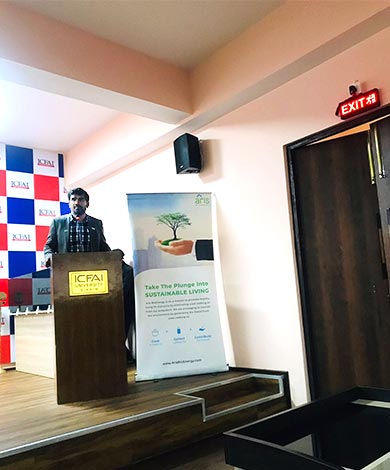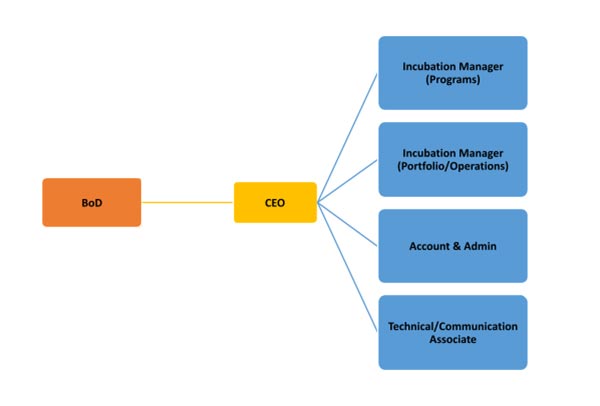Entrepreneurship Innovation Incubation
Introduction
- The Incubation Center at The ICFAI University, Sikkim (IC, IUS) is established to foster a culture of innovation, entrepreneurship, and collaboration among students, faculty, and the broader community.
- The IC of IUS shall function as one of the sub-unit of the Innovation, Incubation & Entrepreneurship Centre (IIEC) of IUS.
- The policy guidelines have been framed to nurture startups and help them scale up into profitable ventures through diligent application of contemporary techniques and technologies to practical problems requiring solutions.
- The policy outlines procedures on pertinent matters related to potential startups incubating in the IIEC IUS Incubator.

The primary objectives of the IC are to:
- Support and nurture innovative ideas and projects with potential for commercialization.
- Provide mentorship, legal, resources, and networking opportunities to incubatee projects.
- Facilitate the development of sustainable startups and enterprises.
- To create robust revenue mechanisms for the self-sustainability of the IIC IUS.
- To create knowledge assets such as IPRs, tech know-how and facilitate the technology transfer.
- To create a positive impact aligned with the Sustainable Development Goals (SDG goals) like eradicating poverty by encouraging entrepreneurial ventures, providing good health and well-being, clean water and sanitation, clean energy, innovative solutions for the industry and others in the relevant social sectors.
- The Incubation Center (IC) shall be registered as a Section 8 company under Companies Act 2013 of the Ministry of Corporate Affair, Govt. of India.
- The Section 8 company shall be established and promoted by the ICFAI University, Sikkim, established under Section 4(2) of the ICFAI University, Sikkim Act 2004 (Act 9 of 2004). The IUS shall be called as the Promoter of the IC or, alternately, as the Host Institute (HI).
-
Board of Directors (BoD):
-
The IC shall be governed by the Board of Directors (BoD). The BoD shall contain FIVE members. The following members constitute the BoD.
- One Director/CEO from the University of IUS (as nominated by the Vice-Chancellor) as the convener of the BoD and Executive Director of the IC.
- 4 senior Assistant Professors from IUS.
- One industry expert.
- One member familiar with innovation and start-up policies and procedures (either from Government or Private sector).
-
The BoD shall provide strategic leadership to the incubator. It will be the top decision-making body. The roles and responsibilities are broadly listed below, though more may be added or deleted as deemed necessary.
- Strategy and vision development
- Financial and governance decisions
- Reporting to Ministry of Corporate Affairs, Government of India
- Team recruitment
- Monitoring and evaluation of the IC
- Policy development and amendment
- Ensure the growth of the IC as per the vision of the host institute and the laid objectives of IC
- Self-sustainability
-
Board of Advisors (BoA): The BoA is authorized by the BoD and will function under the guidelines issued by the BoD
The BoA shall advise on matters that directly concern the below- Industrial Collaborations
- Expert Networking that includes investors
- Fund Raisings through CSR
- Overall guidance for Self-sustainability of the organization
- Creating Social impact through Innovations
- Mentor to the Incubator
- Corporate Leadership
- Overall Strategy vision
- Solving the problems of the eco-system through innovations
-
The BoA shall have no legal responsibilities and is formed to give advice and recommendations to the BoD and management. It cannot compel the BoD or staff to act on its recommendations or its feedback. The Board of Advisors shall:
- be headed by a Chairman who shall be the head of IUS or his/her nominee
- be convened by the Executive Director/CEO of the IC
- be comprised of experts with diverse skills and experiences, preferably from across different domains and sectors
- provide the board and management with objective opinions about the organization
- provide input, skills and knowledge towards specific projects
- sign a conflict-of-interest disclosure and waiver statements
- have a specific duration as shall be decided by the BoD and shall be on pro bono basis
-
Executive Team
This team will report to the BoD. This team is recruited by the BoD.

- The team hierarchy is shown here. The chain of instructions and command follows this pathway. All the staff will be on the payroll of the IUS. The staff may be recruited from outside of the University ecosystem or some of the staff may be deputed to the IC for certain duration of time.
- The CTC for each staff and the duration of the contract shall be decided by the BoD and shall be reviewed annually.
- The schematic above is representative only and the executive team may be changed as deemed fit by the BoD at any time.
-
The IC shall be governed by the Board of Directors (BoD). The BoD shall contain FIVE members. The following members constitute the BoD.
-
An incubator needs to have a separate working space for its operations. The structure and operations of incubators are entirely different from research and academics. It needs dedicated workspace, office, laboratory, business lounges and so on. Based on the above premise, IC shall have the following features
- A minimum dedicated built-up space – 2000 sft.
- The IC shall house Co-working spaces, startup cubicles, meeting rooms, Makerspace, Fablab, cafeteria, Conference Halls and Office rooms.
- The digital infrastructure includes -UPS, Internet, Wi-Fi, Cloud, search tools, Digital tools such as ERPs, video editors, payment gateways, search engines, marketing platforms, portfolio management tools and others.
- The Fabrication/prototyping laboratory typically consists of equipment, tools and devices to build prototypes from the idea stage. The prototype facility can be a domain specific rather than generic. This will help procurement of appropriate equipment.
- The primary stakeholders and chief beneficiaries of any IC would be the students who would be nurtured into startups/entrepreneurs.
- The onboarding of the incubatees shall be coordinated with Institution’s Innovation Council (IC) of IUS. The onboarding of incubatees will be batch-wise as cohorts. Typically, each semester of IUS can support one cohort. Each cohort can have several tribes based on the domain viz. tech-based, social-startups or bio/med-based startups. The cohort-based programs can be structured to be in sync with the IC calendar and further with the University calendar.
- The incubatees can be onboarded through a set of selection process. A committee can be constituted to select the applicants from various departments.
- To get the initial feed, IC shall coordinate with IUS to send circulars, flyers and push messages to the students through the respective entrepreneurship clubs. The selection committee shall review the applications based on the set criteria. Some of the suggested parameters for the selection can be -team strength, problem being identified and researched, solution proposed and its relevance, financial viability and scalability of the idea, social/ecological impact, and so on.
- The IC is also free to conduct the selection process for non IUS entities.
- The IC shall coordinate with its legal wing to assist the selected incubatees with the registration of their company.
- The IC shall also build its internal documentation framework in place while onboarding the incubatees such as -space rental agreement, incubatee hosting agreement, equity sharing agreement and so on as per the need and relevance.
- Mentors show the right direction to the main stakeholders of the IC (the startups). It is of paramount importance for any startup that the direction is far more important than the speed. Mentors’ role is to show the right way for proper scaleup
- The IC shall develop a mechanism to reach out to the appropriate mentors (generic mentors, business specific mentors and domain/sector specific mentors). The IC shall prepare the basket of mentors based on the startup feed.
- The IC can onboard some of the faculty members of the IUS as mentors wherever found appropriate.
- A standard selection and operational process shall be prepared to onboard mentors based on parameters such as – communications, agreements, remunerations, guidelines to the mentors and mentees, scope of work, roles and responsibilities of mentors, and exit methods to the mentors. These formalities shall be prepared in consultation with the IC and other experts.